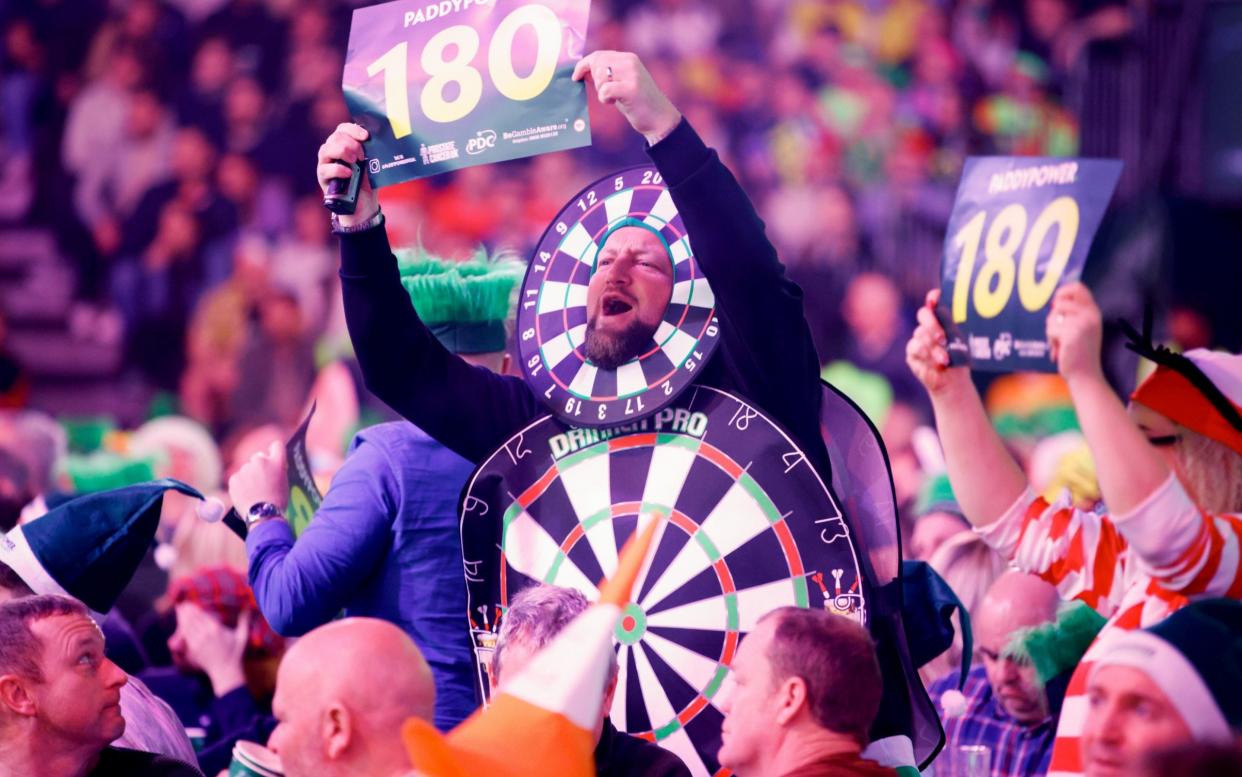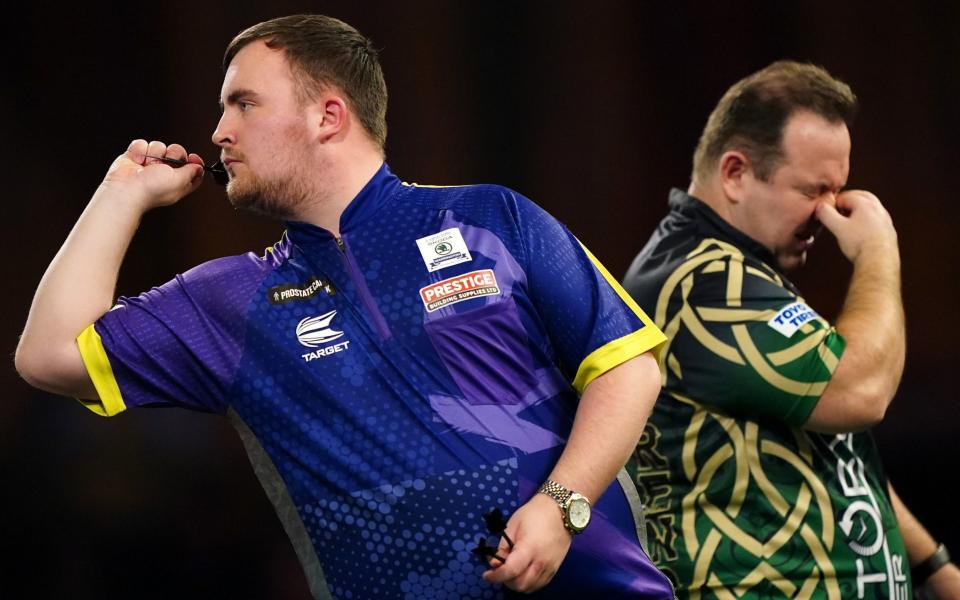Sorry to all Luke Littler fans but darts is not a real sport

- Oops!Something went wrong.Please try again later.
- Oops!Something went wrong.Please try again later.
- Oops!Something went wrong.Please try again later.
- Oops!Something went wrong.Please try again later.
The point at which the Luke Littler phenomenon slipped the moorings of reality was when he began drawing parallels with Tiger Woods. Barry Hearn, fond of characterising darts as the “working man’s golf”, appears convinced that the swathe the teenager has torn across this year’s world championship represents a Tiger moment for our times.
At 75, Hearn has lost none of his twinkly salesman’s patter. But his latest comparison is as overwrought as Sid Waddell likening the noise at an Eric Bristow match to the sounds of Pompeii being swamped in lava – and about as plausible.
Woods, converting the “hello world” hype of his first Nike advert into a record 12-stroke Masters triumph at 21, became an athlete for the ages. The operative word here is athlete, with Woods shredding the preconceptions of his sport through his dedication to fitness. By 1997, he would start his mornings by running four miles and lifting weights. In the afternoons, he would hit the range for two hours and play 18 holes, before running another four miles by sundown. This was perfectionism with a purpose, as he turned up at Augusta and swatted the ball 25 yards further than anyone else in the field.
You struggle to envisage a similar performance benefit in darts. As if to prove the point, Littler, 16, has described his own daily regime thus: “Wake up, play on my Xbox, have some food, have a chuck on the board, go to bed. That’s it.”
He has been celebrating his victories at Alexandra Palace with kebabs and Cokes. All of this adds, naturally, to the relatability of the Littler story, to the Boys’ Own adventure of a teenager earning a six-figure cheque and promising to put it towards a trip to Alton Towers. His is a success worthy of the widest celebration. What he does not warrant is a place on the same pedestal as Pele, Woods, Mike Tyson, or all the other wunderkinds whose feats involved physical sacrifice.

‘It’s tiddlywinks in a bearpit’
Darts’ credentials to be called a sport have been endlessly disputed, even by those wedded to its original spit-and-sawdust charms. The late Martin Amis wove every facet of darts culture into his novel London Fields, viewing the game as the “crudest possible form of human striving” and reputedly naming central protagonist Keith Talent after Keith Deller, the 1983 world champion. In trying to explain why he fell in love with this world, he said: “On a tiny scale, it is elemental. It’s really tiddlywinks in a bearpit.”
It is a cute line, but if you are going to use tiddlywinks as your point of reference, has the argument for sporting recognition not already been lost?
At one level, darts has moved on from this debate. In 2005, the English Institute of Sport bestowed the kudos to which the nation’s tungsten-throwers had long aspired, officially designating their pastime as a sport. Amid the euphoria, Martin Adams bracketed himself with Geoff Capes, the former world’s strongest man, saying: “He stood still and hurled lumps of metal. If he can be a sporting hero, so can I.”
Phil Taylor would later reflect that he treasured his second place as BBC Sports Personality of the Year in 2010 more than any of his 16 world titles.
But in another sense, the debate over darts’ borderline status between sport and pub hobby has never gone away. No sooner did it secure sporting legitimacy than bridge mounted a legal challenge to demand the same. And with the rise of Littler, its true essence comes under renewed scrutiny, for the simple reason that none of his fundamentals, from training to diet, conform to what we expect of a sporting prodigy.
The videos uploaded by his sister of Littler in a nappy, throwing darts at a magnetic board, are testament to how seriously he takes his craft. But this is not a prowess built on physical endeavour. It is the mastery and memorisation of a fine motor skill, to the point where he can repeatedly bunch three arrows in the treble 20 bed at will. All of which is admirable, especially when performing in front of thousands of sozzled punters.
But as for all the breathless linking of Littler with Nadia Comaneci, Jennifer Capriati and the other teenage stars who astounded with their physical virtuosity? Forget it. I tend to lean towards the view of Rob Bonnet, the BBC sports correspondent who, despite his employer’s popularising of darts pre-Sky, once said: “Darts won’t be a sport until the players need to do more than bend their right arms and wear a path between oche and board.”
Darts might now be a lavish global business, but its leading practitioners are no less pictures of health than when Steve Beaton laboured under the nickname of “Bronzed Adonis”. Raymond van Barneveld ballooned out to 21 stone before committing to lose weight. Adrian Lewis alleged that he was called a “fat something” by Gerwyn Price mid-match.
Once, these comfortably-upholstered physiques were the product of heavy drinking, as immortalised in the Not the Nine O’Clock News sketch of Dai “Fat Belly” Gutbucket reaching down for a double vodka and treble Bacardi. Now, they owe more to top players’ itinerant lifestyles, with Gary Anderson admitting that one of his main challenges on tour is avoiding airport fast food.
It has been a stroke of genius to rebrand darts as a serious physical enterprise. But you wonder, given the shape of many of its stars, how far it has evolved from the days of the Indoor League on Yorkshire Television, when Fred Trueman would show it alongside games of skittles, cribbage and shove ha’penny. If Littler is going to be prematurely placed in a sporting pantheon, then some measure of athleticism, however modest, should surely be a prerequisite.

